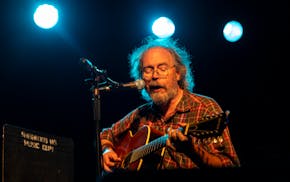Zenobia Silas-Carson didn't want her former boss to know she was losing her eyesight.
"My manager never caught me squinting with my nose against the monitor trying to see," she said.
The Brooklyn Park woman has been told her vision is dimming due to cataracts, in combination with macular degeneration or nerve damage due to diabetes. Injections and laser treatment haven't helped. She can still see but does not know if, or when, the condition will worsen.
But she has found a constructive way of facing the problem: helping others who share her struggle with midlife vision loss.
"I always tell people that no sad or bad life experience is worth its salt unless it is [followed by] a redemptive ending," said Silas-Carson, 74.
She assembled manila envelopes for others in her senior residence with resources they might turn to for vision problems or other troubles. Among the suggestions was Hadley, a nonprofit based in Winnetka, Ill., that uses workshops, podcasts and discussion groups to offer free education, connection and support to people with vision impairments.
She has taken more than 40 courses through the organization — learning how, for example, to use Zoom and access special low-vision features on electronic devices. Silas-Carson, who is working on a memoir, also joined a group of writers with vision loss through Hadley.
She has learned skills like how to get around the house, how to measure ingredients when cooking, how to know how high the flame is on the stove. These skills, she said, involve "using your other senses — not the one you've been relying on the whole time."
She praised Hadley on Facebook, saying its programs "are giving me new hope and I am exploring more every day and sharing with others in my community ... to NEVER give up on life!"
After at least 200,000 saw the post, Hadley presented Silas-Carson with its Heroes Award, which every year recognizes four people who help the organization by giving extensive feedback or suggesting new services.
"She's an inspiration," said Joan Jaeger, Hadley's chief marketing officer. "She really does want to help other people not struggle with the things that she's struggled with."
A life of challenges
That's been a theme throughout Silas-Carson's life. She married at 17 and had six children (and five miscarriages) by age 29. One of her children died at age 2. She was given a hysterectomy but was later told by experts that it wasn't medically necessary and that women of color often were subject to involuntary sterilization as recently as the 1970s.
She said she was physically abused, got divorced, spent time in jail, moved from Chicago to the Twin Cities and was homeless for a while.
That's a lot of adversity. But Silas-Carson is not one to let hardship keep her down.
"You're talking to a fighter," she said. "I like to believe that no bitterness from the past has attached itself to my heart. ... My faith has carried me far beyond the boundaries of anger and regret. I push forward to higher levels always."
Always a good student, Silas-Carson returned to school, studying human services in community college. She became active at the Whittier Community Theater and the Loft Literary Center, both in Minneapolis. She organized journal-writing and tai chi classes, published poetry and two books of inspirational fiction, and began working on the memoir. She took jobs working with women being released from prison and advocating for residents of a women's shelter.
"You can't just tell a battered woman, 'Get over it and go out there and get a job,'" she said. She persuaded shops in Minneapolis' Uptown to donate makeovers, hair dryers and clothing to smooth their entry into the workplace.
More recently, she distributed free food to residents of her building. But that was part of a job as building assistant, from which she was recently laid off.
"I spent about a month being Eeyore," she said, referring to the gloomy, pessimistic donkey in the Winnie-the-Pooh books. "Then I said, OK, what are you going to do now? You can't stay in these doldrums, you can't sit around in your apartment. So I got back to writing and doing stuff again."
Now it's time for her to face the challenge of vision loss, again in part by reaching out a helping hand to others.
"People think, 'Well, all that stops, right, when you can't see anything? That will call everything to a halt?' Well, no," Silas-Carson said.
"There's so much more I haven't explored yet ... all of the things you thought you knew."

Critics' picks: The 11 best things to hear, do and see in the Twin Cities this week

Critics' picks: The 9 best things to do and see in the Twin Cities this week

The 5 best things our food writers ate this week

The 5 best things our food writers ate this week
